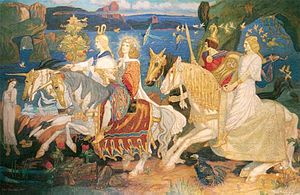
The name of the month of August in all three Gaelic languages is derived from the Celtic god Lugh (also known as Lug and in Modern Irish: Lú). In Modern Irish August is called Lúnasa, in Scottish Gaelic: Lùnastal, and in Manx: Luanistyn. At the beginning of the month Lughnasadh is celebrated. It is one of the four Gaelic seasonal festivals, along with Samhain, Imbolc and Beltane. The festival of Lughnasadh (also known as Lughnasad), is, like the month itself, named after the god Lugh. Traditionally held on the first day of August it was widely observed throughout Ireland (Éire), Scotland (Alba) and the Isle of Man (Mannin). Clearly Lughnasadh was regarded as an important pre-Christian festival and is mentioned in some of the earliest Irish literature.
August was seen as a time that marked the beginning of the harvest season. The Celtic year appears to have been driven mainly by agrarian concerns. The festival day is called Lá Lúnasa (Day of Lúnasa) in Irish or either Laa Luanistyn or Laa Luanys in Manx. There were a number of traditions associated with Lughnasadh in times gone by including ritual ceremonies, feasts and athletic competitions. These festivities were said to have been originated by Lugh himself and to have celebrated his deeds and those of members of his family, in particular his mother. Some festivals continue to be held specifically in celebration of Lughnasadh and others, including the Puck Fair, held in early August in the town of Killorglin, County Kerry (Irish: Cill Orglan, Contae Chiarraí) is believed to be a survival of a Lughnasadh festival.